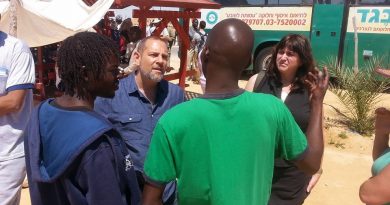Human Rights and Passover
As of last week, I'm the chairman (well, co-chair actually, along with Rabbi Moshe Yehudai) of Rabbis for Human Rights.
On hearing this, some friends have reacted with a little surprise, knowing I have a heavy work and travel schedule. Like I didn't have enough to do with my "spare time."
I accepted, with humility, this important task because I think it's vitally important. And the reason I believe it's vitally important is because of lessons I learn from the story of Passover.
The lessons are:
- We are commanded to be kind to the stranger, because we know what it's like to be a stranger. Over and over again the Torah commands us (in different words in different places) "You shall not oppress a stranger, since you yourselves know the feelings of a stranger, for you also were strangers in the land of Egypt."
- When we recite the ten plagues, we take a drop out of our cups with each one, to symbolically reduce our joy because others suffered as we were liberated.
- When the angels wanted to sing praises to God after the parting of the Red Sea, God stopped them, saying "how can you sing when my children are drowning?"
- I also learn that our concern for others extends to everyone, as we recite: "let all who are hungry, come and eat."
RHR has a reputation in some circles as only being concerned with the human rights of Palestinians — leading some detractors to label us "Rabbis for Palestinian Rights." That accusation is wildly inaccurate: we are concerned with the human rights of all humans in Israel and territories under Israeli control: Jews, Muslims, Christians, Druze, Bedouins, foreign visitors, temporary workers, you name it. We are all created in the image of God, and our concern extends to all. RHR's work is in three major areas:
- Human rights in the West Bank
- Human rights education
- Social and economic justice
The work we do in the West Bank — supporting Palestinian farmers who are harassed by settlers, arguing against unjust home demolitions, working to make sure the Israeli authorities respect the human rights of those under their jurisdiction — gets the most headlines. Because it's very dramatic if our executive director, Rabbi Arik Ascherman, gets arrested for standing in front of a bulldozer, or protesting where the government doesn't want protesters. But the other work we do — educating Jews on what the tradition has to say about human rights — interestingly, including in some settlements — and fighting for the rights of poor people, including both Jews and Gentiles — is equally important, even if it doesn't make such dramatic headlines.
RHR as an organization is in a very lonely place: we are unabashedly Zionist. Whether immigrant or Sabra, all of our members are very committed to the idea of Israel as a Jewish state. Which makes us somewhat suspect in the eyes of many organizations that are concerned about human rights in the West Bank and Gaza. And we ARE concerned about the human rights of all, including Palestinians, which makes us suspect in the eyes of other Zionist organizations. That tension, however, is exactly where I believe the Jewish tradition — Torah, Talmud, our history, etc. — tells me to live.
Passover has messages that are both particular and universal. We leave Egypt to serve God, and God gives us the Torah, our uniquely Jewish way of serving Him. At the same time, part of what God commands us to do is to care about others, to make the world a better place. We cannot neglect either side of that equation.
So even though I just got rid of my chametz (leaven), which is supposed to symbolize pride, in all humility I remain proud to support the work of RHR, and look forward to contributing to the effort to see Israel live up to the ideal of a Jewish AND democratic state, striving to be a light to the nations.
Chag sameach,
Reb Barry


Chag sameach and Mazel Tov Barry. I think you’ll make an excellent co-chair for your NGO.